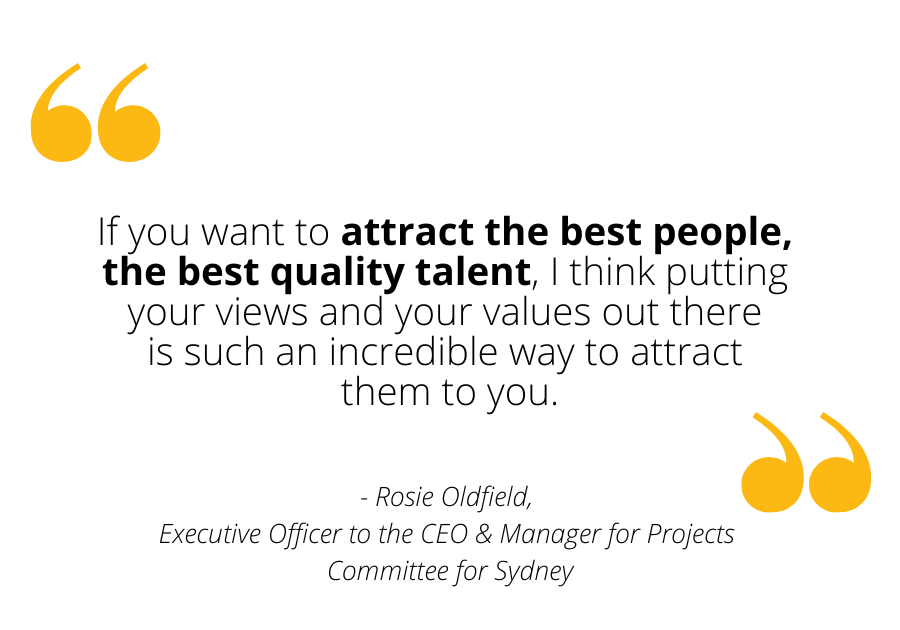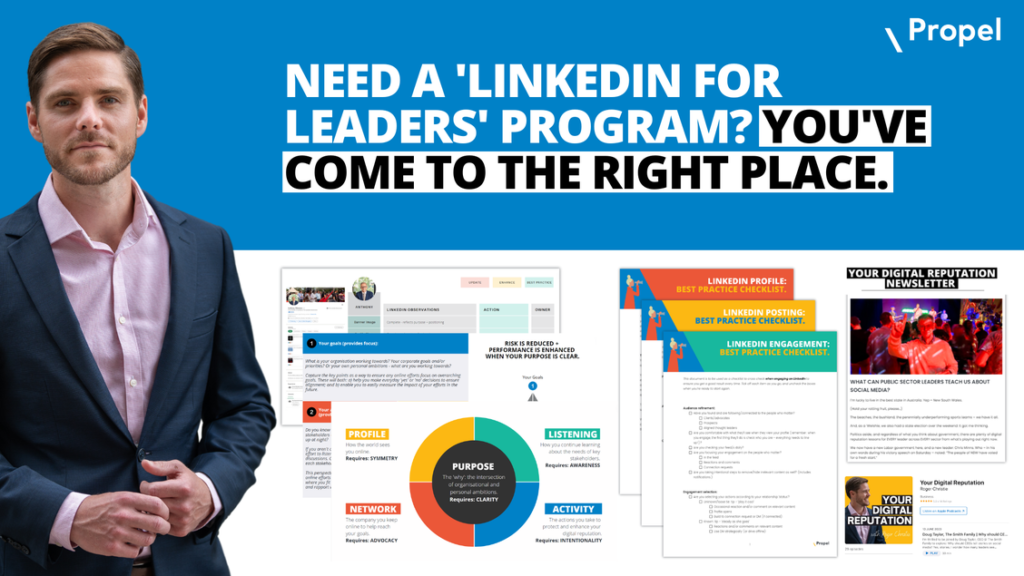
Did you know 80% of candidates are looking at your LinkedIn profile when considering whether to work with you or not?
Did you know they’re also 4x more likely to want to work with leaders who use social media than those who do not?
Compelling data (via Brunswick).
Data that reveals this simple truth:
If you’re in the market for good talent and your leaders AREN’T using LinkedIn (or using it effectively), you’re missing an enormous opportunity.
If that’s you – or someone you know – I’m going to break down what you can do to fix that in this newsletter.

Last week I had a superb conversation (Episode 33) with three professionals at the growth stage of their careers, who shared just how much of an influence their respective ‘social CEOs’ had had on them.
You can listen to their fascinating stories here.
In short, without their leaders being visible and active on social media:
Rosie Oldfield would have never taken the job she did;
Elliott Franks would have never felt empowered to talk proudly about his work, and form invaluable industry connections via LinkedIn; and
Dani Maidens would have never felt empowered to bring her authentic self to work, and become an unofficial ambassador for her neurodiverse peers.
What these three stories show is that by these leaders stepping up and speaking up online, the positive impact they’ve had on those around them is far greater than any personal gains. They have empowered their teams who have – in turn – gone on to empower others online, too.
The flow on effects of any leader’s efforts online are clear. They are limitless (seriously). And they are a vital multiplier – a competitive advantage – in your organisation’s quest to find, attract and retain the best talent today.
Rosie’s POV and advice to leaders above is refreshingly clear.


And here’s what Elliott Franks shared about the impact his then boss, Mike Kaiser, had by using LinkedIn to restore belief and pride among public servants:
“It was about 3-4 years ago, we had a new DG come in, Mike Kaiser. [It] was a breath of fresh air to have a senior leader who would – on LinkedIn – say how he felt.
“He’ll talk about the department, talk about the projects he’s working on and, most importantly, talk about why they’re so important to Queenslanders.
“He really changed things in our department because him doing that allowed the freedom for the rest of the senior leaders to then also show their passion and talk about why they love what they do.
“[I]t kind of freed everyone up…all the DGs following, calling out staff for their amazing work, talking about the projects.
“It’s been really valuable for public servants to be proud. That’s the big change.”
(If you haven’t yet listened to my chat with Mike Kaiser (Episode 24), it’s a great listen – click here to tune in.)

So, if you’ve been nodding along thus far – you’ve seen the hard data, you’ve heard the human stories, and you’re now thinking:
‘Ok Roge – I’m sold. Tell me what I need to do.’ – here are a few very practical steps you can take straight away.
1. First things first, make sure your shop front is in order.
If your LinkedIn profile doesn’t already reflect the leader you are, what you stand for, and your corporate culture, you’re potentially turning talent away.
They are googling your name. Your LinkedIn profile will likely be the first result they see. That’s a huge opportunity to make a positive first impression – grab it.
There are any number of actions you could take in this important first step – your profile visibility, your profile and banner image, your About section, Featured content. Fill any gaps. And, if you’re not sure, drop me a note.
2. Connect with your colleagues.
This sounds so simple, yet so many leaders still miss this opportunity. By you connecting with your staff – yes, you – you send an incredibly powerful message to them that they’re seen and they matter.
You can fast track this process by clicking the ‘XX employees’ hyperlink on your organisation’s Company Page – scan the list and send simple-yet-personalised connection requests to anyone outside your network. Or get your team’s help if need be.
In case you’re having doubts about this step and connecting proactively, it’s not ‘strange’ – it’s energising for your people and will give them an enormous boost. Just chip away over time.
3. Listen, participate, celebrate.
Because you’ve started reaching out to all your staff, the wonderful LinkedIn algorithm will suddenly share all the amazing things they’re doing and saying online with you. Direct to your feed. You don’t even need to go looking.
This isn’t ‘noise’ – it’s another wonderful opportunity to listen, learn, participate and even celebrate the work they’re doing. Remember Novartis’ Marie-France from our last newsletter? A simple, thoughtful comment from a leader goes a long way.
4. Share what inspires you.
It is more important that you celebrate your people, meaningfully, than posting all the time. But candidates still want to know what makes you tick.
Share a post on something that happened during the week that really inspired you. Let people know something different about you, beyond the corporate suit. Talk about something you read, watched or listened to that changed your perspective.
It doesn’t need to be overly long or vulnerable, but these are the posts that help people connect with you even before they’ve joined your team. They can see news, products, services and performance from your website – go a layer deeper on LinkedIn.
5. Listen (again!) and reply.
Remember, your job isn’t done after posting. This is your best opportunity to project corporate culture. Read the comments people share under your posts. Take the time to react and reply – not only does this trigger the algorithm and boost the performance of your post, it validates others’ efforts and encourages them to interact with you in the future.
Do all this knowing that every little exchange will be seen by your future talent who are not just inspired by how competent or capable you are, but by the way you treat your people.
If you follow just these five steps, you will turn your LinkedIn presence – the very first search result on Google when people go looking for you – into a globally-accessible, rich reflection of your leadership style. They’ll see what you stand for, the amazing work your team is doing, and so many examples – from your people – that will convince them to come and work for you.
Your LinkedIn presence will become a talent attraction machine.

But to access these benefits, LinkedIn MUST be part of your talent attraction program.
Every organisation should – of course – look to empower more than just the sole executive or leadership team. But your efforts on LinkedIn have to start somewhere, and the truth is people look to leadership.
They want to hear from you.
If you want to help your organisation and become a talent attraction machine via LinkedIn, drop me a note. Our Your Digital Reputation program for leaders provides the foundations you need to get the most from any time you spend on the platform, and to ensure candidates like what they see – and act.
There’s more than enough evidence to show what you and your organisation will gain. The question is whether you’re ready to capitalise.
Take care,
Roge

Want more just like this delivered straight to your inbox? Join hundreds from around the world receiving Roger Christie’s latest digital reputation advice, trends and the best practice examples of the leaders getting it right online. We’d love to have you part of this growing community.